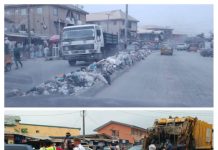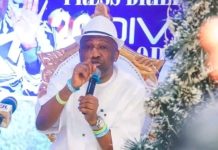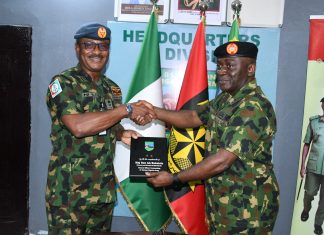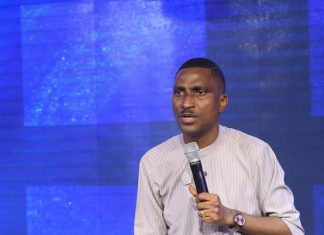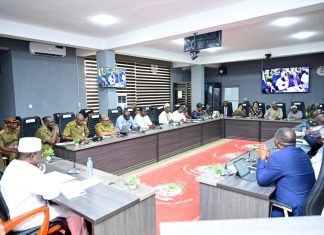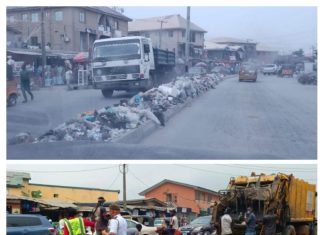Lagos State Governor, Mr. Babajide Olusola Sanwo-Olu has stated that bridging the gap in the engineering infrastructure through proper funding will have direct and indirect impact on a number of other sectors in the economic fortune especially in the area of revenue generation.
The Governor stated this today at the Nigerian Academy of Engineering Annual Lecture with the theme “Financing Engineering Infrastructure” held at J.F Ade Ajayi Auditorium, University of Lagos, Akoka, Yaba Lagos.
The Governor who was represented at the event by the Deputy Governor, Dr. Kadri Obafemi Hamzat emphasized that collaboration and partnership among all stakeholders remain a key strategy which the government must adopt and explore to achieve its goal and objective.
According to Sanwo-Olu “In the face of dwindling economic fortunes especially in the area of revenue generation, it becomes absolutely imperative for the government to apply innovative and creative strategies to bridge the financing gap being experienced in the country as the government alone cannot provide all the solutions.
“We must do a lot of inward-looking and come to terms with the fact that the government alone cannot provide all the solutions. Collaboration and partnership among all stakeholders remain a key strategy which we must adopt and explore to achieve our goal”, he said.
Speaking further, the governor stated that the knowledge of engineering is key to attainment of the industrialization goal of any country, given the increasing role that technology plays in advancing economic growth, development and prosperity in the 21st century.
He therefore noted that it is imperative that emphasis is placed on the acquisition of the required knowledge and skill as well as the provision of necessary support for professionals in the engineering, science and technology related sector to enable them channel their knowledge and expertise towards developing sustainable solutions to the nation’s local challenges.
In his paper, the Governor of Anambra State, Prof. Charles Soludo who was the Guest Lecturer at the event, disclosed, among other issues that despite alternative financing initiatives, infrastructure needs and provision in Nigeria continue to widen due to rate of population growth and urbanization.
He therefore called on the government to invest eight to 10 percent of GDP in public infrastructure per annum for the next 10 years to meet public needs as the provision of infrastructure is germane to the wellbeing of the citizens and development of the country.
The former CBN Governor advised the federal government to deploy 90percent of the savings from the subsidy and liberalization for infrastructure and social development rather than spending.
Besides, Soludo was of the view that for the federal government to succeed in infrastructure provision, it’s necessary to collaborate with state governments who understand the most priority of their needs. “For example, in the area of road infrastructure provision, the state governments are in the best position to know the alignment of roads from one end to the other. Thus, it is imperative that such project(s) require joint collaboration for a successful and functional execution”, he advised.
Earlier in his address, the President of the Nigerian Academy of Engineering, Prof. Peter Onwualu said the Institution is ready to assist governments in providing advice in actualizing its goals in all areas by using engineering and technology to drive development.
Prof. Onwualu stressed the country is currently faced with challenges in almost all sectors of the economy, most of which he believes can be overcome if the country applies engineering and technology in a sustainable manner.
He said, “The transition of the new government at the federal and state levels throws up opportunities for us as a nation to solve these problems through a judicious and sustainable application of engineering and technology to improve productivity in all sectors of the economy. Application of engineering and technology-based solutions can enable the country to eliminate poverty, food insecurity, infrastructure, electricity supply, healthcare, among other”.
He added that for this to happen, the Government needs to strengthen the efforts in the area of acquisition and dissemination of emerging technologies and using them to drive economic development.
In his remarks, Engr. Iyiola Omisore has called on the engineering sectors in Nigeria to help in capital building and financial development noting that it will enhance development, eliminate poverty, and growth in the country.
He therefore implores engineers to scale-up their skill by training and retraining for unskilled and inexperienced engineers not to take over the administration capacity of the country, saying, “there is only one way for the country to move forward which is a functional engineering system”.


This is another opportunity to own a faster-loading website to expand your business and take it digitally online. Meet the best website designer/master coder for any kind of website. Contact them now it is affordable Chat now: 09077260922



